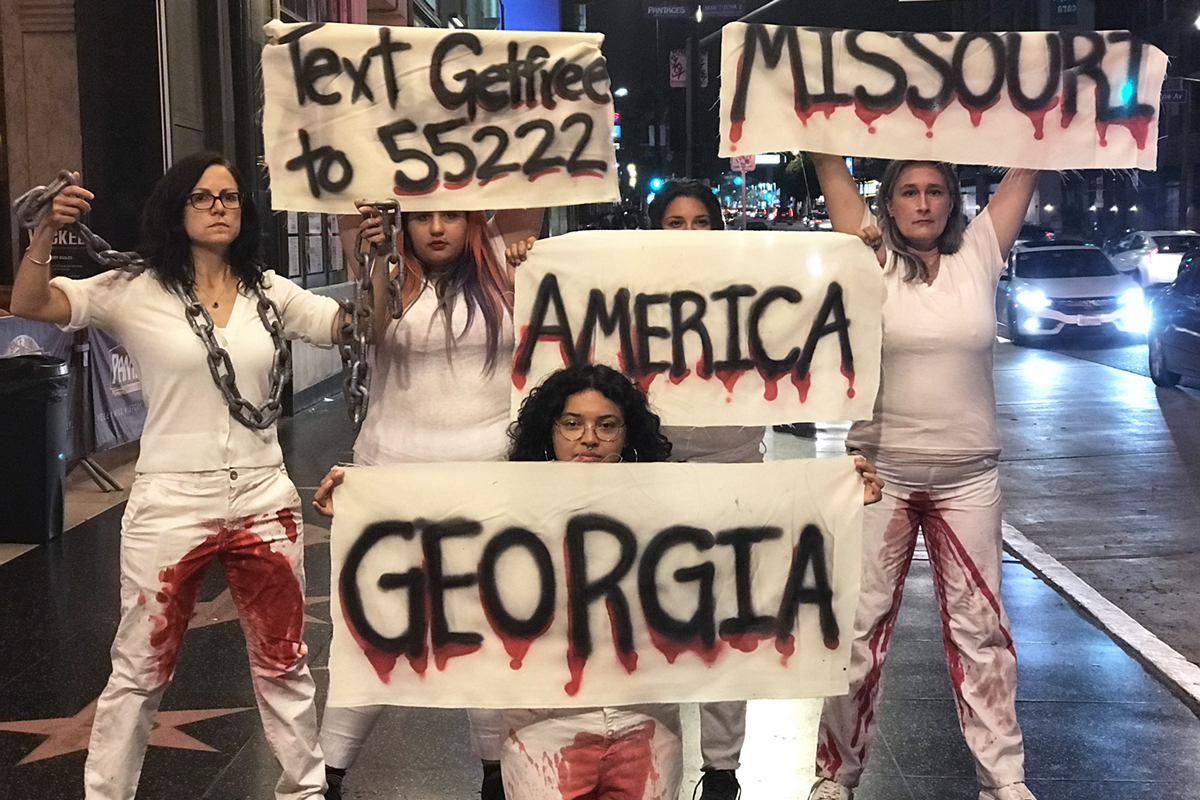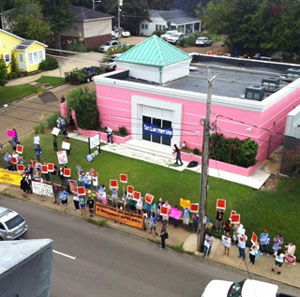The Stakes of and Dangers for Women’s Right to Abortion
Supreme Court to Hear Mississippi Case on Restriction of Rights
| revcom.us
“... And the fascist section of the ruling class has, over a number of decades now, waged a relentless attack on Constitutional rights, and mobilized their social base of religious fundamentalist fanatics, to forcefully and often violently assert ‘traditional’ patriarchal oppression—with the assault on the right to abortion, and even birth control, a major focus of this attempt to essentially enslave women.”
In an ominous move, the U.S. Supreme Court has decided to hear a case concerning a Mississippi law restricting most abortions after 15 weeks of pregnancy. It’s not possible to predict how the court will rule on this case.
But the stakes here are very high.
For many decades now, Christian fascist and reactionary anti-abortion forces have been passing numerous state anti-abortion laws—with expectation that legal challenges to such laws would eventually result in a Supreme Court ruling that would either outright overturn or drastically gut the landmark 1973 Roe v. Wade decision that legalized abortion in the U.S. Just this month, the governor of Texas, Greg Abbott, signed a law prohibiting abortions after as early as six weeks. This is one of more than 60 new state restrictions on abortion enacted just this year.
The Mississippi case, Dobbs v. Jackson Women’s Health Organization, will likely be heard in the Supreme Court’s next term, starting in October. A decision is expected to come in the spring or early summer of 2022. The case concerns a Mississippi law enacted in 2018 that bans most abortions after 15 weeks of pregnancy—which is about two months earlier than Roe v. Wade allows states to largely ban abortion. After the Mississippi law was enacted, the state’s sole abortion clinic sued, saying the law was in violation of Roe v. Wade. Lower courts ruled the law was plainly unconstitutional under Roe, which forbids states from banning abortions before fetal viability—the point at which fetuses can sustain life outside the womb, or about 23 or 24 weeks.
The Christian fascist-dominated Supreme Court could use this case as an opportunity to directly attack Roe. But even if it doesn’t do this, there are other scenarios where a ruling could seriously undermine a woman’s right to abortion. For example, by coming up with some reasoning to uphold the Mississippi law, the court’s ruling could set a precedent upholding other laws banning (not just putting restrictions on) abortions before viability.
Actually, if the anti-abortion forces had it their way, “viability” would be defined as anything after conception! And the real issue here is not fundamentally about a fetus or a “baby.” It is about the right of women to control their reproduction and to be able to equally participate in all aspects of society. That is why all anti-abortion groups also oppose birth control. Let’s be clear: Fetuses Are NOT Babies. Abortion Is NOT Murder. Women Are NOT Incubators! And forcing women to have children against their will is a form of enslavement.
Increasing Supreme Court Restrictions on Abortion
Since the Roe v. Wade decision, the Supreme Court has increasingly narrowed the basis for which women have a right to an abortion, thus expanding the scope of restrictions allowed against abortion. For example, in its 1992 ruling, Planned Parenthood v. Casey, the Supreme Court for the first time ruled that states could restrict abortion at all stages of pregnancy (through things like mandatory counseling and waiting periods, parental consent laws, etc.) and that abortion could be restricted for reasons other than women’s safety. The court also changed the legal standard for abortion restrictions. No longer would those proposing restrictions be required to prove a “compelling state interest.” Instead, those challenging new restrictions would be required to prove that the restrictions placed an “undue burden” on women’s access to their rights.
The Casey decision represented a significant attack on abortion rights. While upholding the constitutionally established right to an abortion, the court enabled states to enact a wider range of restrictions on abortion that have closed down clinics and put medically unnecessary obstacles in the way of women accessing abortion, like mandatory waiting periods, parental consent laws, and much more. And now, a ruling in favor of the Mississippi law could go even further.
For many years now, the Supreme Court has included several justices who are clearly anti-abortion. Then in September 2020, Justice Ruth Bader Ginsburg, who was pro-choice, died. And she was replaced by Justice Amy Coney Barrett, a religious ultra-conservative who has repeatedly spoken out against “abortion on demand.” Barrett believes all abortion is immoral and “barbaric.” While she refused to answer at her Senate confirmation hearing whether she would vote to overturn Roe v. Wade, she made clear that she was open to doing that.
Nancy Northup, president of the Center for Reproductive Rights, said, “The consequences of a Roe reversal would be devastating.... Over 20 states would prohibit abortion outright. Eleven states—including Mississippi—currently have trigger bans on the books, which would instantaneously ban abortion if Roe is overturned.” Lawyers for the Mississippi clinic wrote that the new law “places a complete and insurmountable obstacle in the path of every person seeking a pre-viability abortion after 15 weeks who does not fall within its limited exceptions. It is unconstitutional by any measure.”
What is concentrated in these developments is both a manifestation and part of what Bob Avakian (BA) has sharply posed:
The whole question of the position and role of women in society is more and more acutely posing itself in today’s extreme circumstances—this is a powderkeg in the U.S. today. It is not conceivable that all this will find any resolution other than in the most radical terms and through extremely violent means. The question yet to be determined is: will it be a radical reactionary or a radical revolutionary resolution, will it mean the reinforcing of the chains of enslavement or the shattering of the most decisive links in those chains and the opening up of the possibility of realizing the complete elimination of all forms of such enslavement.
from BA’s New Year’s Statement, A New Year, The Urgent Need For A Radically New World—For The Emancipation Of All Humanity

Standing up for abortion rights at a performance of Les Misérables in Los Angeles, June 2, 2019.

Rally defending the Jackson Women's Health Organization in August 2013, during the Abortion Rights Freedom Ride.
NEW YEAR’S STATEMENT BY BOB AVAKIAN
A New Year,
The Urgent Need For A Radically New World—
For The Emancipation Of All Humanity
Get a free email subscription to revcom.us:

